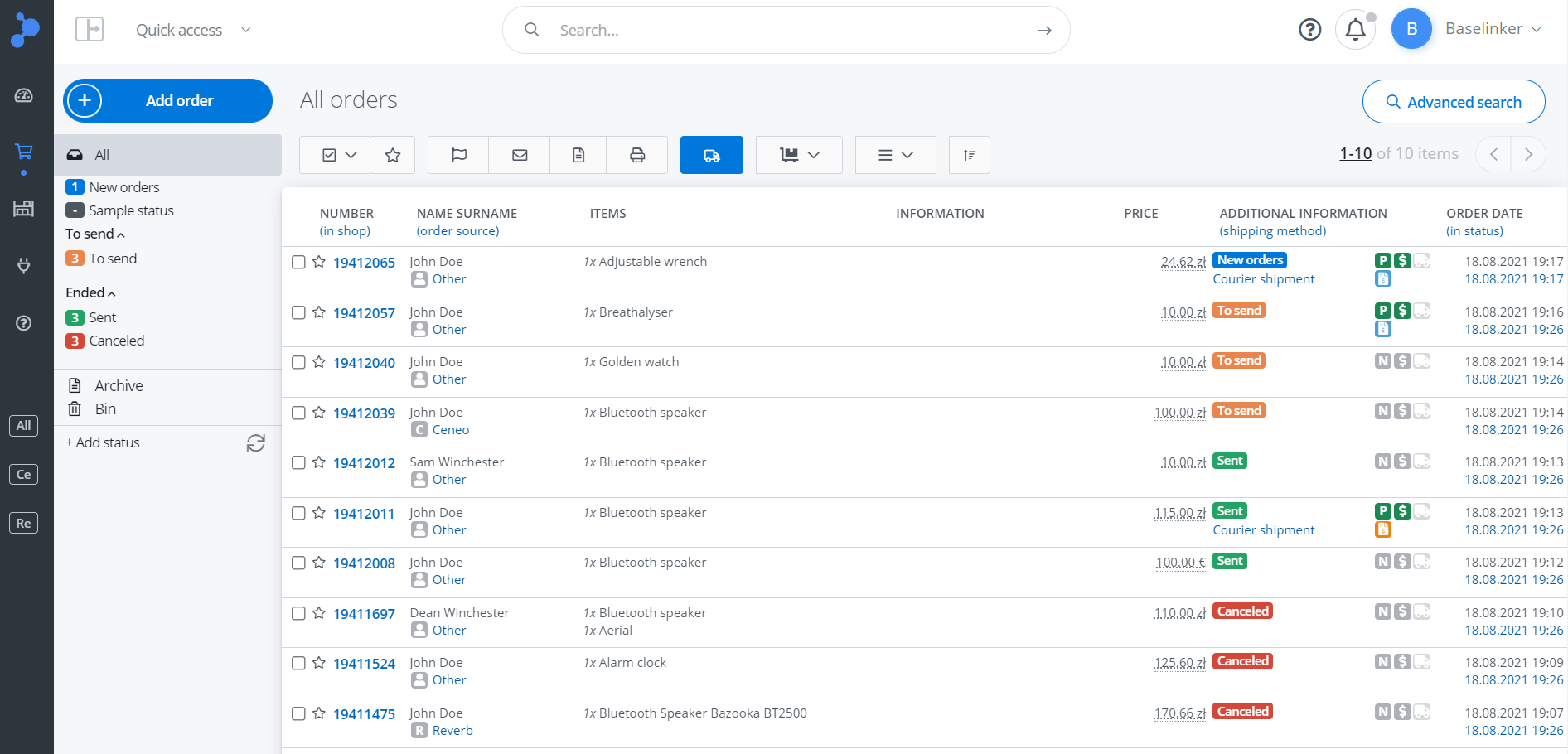BaseLinker: the tool, challenges and BaseLinker alternatives

Managing your eCommerce will get tedious the bigger your business grows. With increasing customer interest, multichannel sales, new opportunities and expansion to new markets, the number of topics to cover will grow quickly. Fortunately, many of the associated tasks can be delegated – and not to a man, but to the right piece of software. Automation is a must these days, and the more open you are to the notion of a machine doing the job for you, the more time you have to spend on the strategic aspects of building your business. BaseLinker and its alternatives provide you with the tools you need to shift your focus from mundane tasks to what is truly critical for your eCommerce growth.
What is BaseLinker?
For many companies, BaseLinker is the go-to software solution for facilitating the operation of an eCommerce business. It allows for the seamless integration with shops, marketplaces, courier companies, and accounting software. BaseLinker enables businesses the management of multiple storefronts through a single interface. Service all your orders from different stores, create and edit new offers on a large scale for multiple platforms simultaneously, synchronize warehouses and prices, and automate as many processes as possible. With BaseLinker, you no longer have to log in to every store separately. With so many different ways in which the software supports eCommerce, it’s no surprise it has become one of the leading solutions of its kind in Europe.

Source: BaseLinker, https://baselinker.com/en-EN/help/knowledgebase/order-list-how-to-use/, access: 2.01.2024.
BaseLinker integrations
The biggest strength of BaseLinker is undoubtedly the ability to effortlessly integrate the many different services an eCommerce needs to thrive – all in one place. Inventory management integrations help with syncing product listings, tracking stock levels, and updating inventories across all relevant stores. With order management integration, any eCommerce can process orders from multiple channels in one place, automating many aspects and taking off a lot of the burden from the staff. Shipping integrations add leading delivery providers to the system, streamlining the shipping process by generating labels, providing tracking information to both the client and the business, saving time and speeding up the process as much as possible. Marketplace integrations link the eCommerce with platforms such as Amazon or eBay, enabling sales monitoring, product listing management, and generally simplifying multi-channel selling. Same goes for merging the platform with Shopify, WooCommerce, Magento, etc. To introduce order to finances, there are special accounting integrations with software such as Xero and QuickBooks. With these solutions, many financial processes can be easily tracked and automated, this includes the transfer of information, sales, expenses, invoices and more. Accurate financial insights help make better business decisions. These solutions often go hand-in-hand with payment systems’ integrations to have complete control over the flow of financial resources. Lastly, the integration with analytics solutions such as Google Analytics and Facebook Pixel help track website traffic and monitor conversions and customer behavior, resulting in better, data-driven decisions.
Problems with BaseLinker integrations
With such a versatile tool, there are bound to be issues at some point. Sometimes the integration with external systems, e.g., WooCommerce, Allegro, may pose difficulties. All modern platforms that wish to remain competitive go through frequent updates, which, while fixing old problems and providing new functionalities, may also lead to issues with integration and compatibility. Sometimes there might be errors with data synchronization, for example, in terms of inventory levels, order details or product information, leading to needless confusion. Real-time updates can be impaired by API limitations, resulting in incomplete data sync and delays. External software may pose difficulties with integration depending on the current version, leading to further compatibility issues and the need for additional troubleshooting. Bugs are nothing unusual even in software that has been developed and updated for many years. Integrating two pieces of software may lead to additional technical glitches. API changes can hinder the performance of integrations and may necessitate reconfiguration. One also has to pay attention to whether the new integrations do not cause any security vulnerabilities, and if they comply with data protection regulations (such as GDPR for the EU).
It’s worth highlighting that BaseLinker provides the support and resources needed to overcome potential issues, and many companies that rely on software agencies to do the BaseLinker integrations simply leave the entire process to these providers.
BaseLinker alternatives
There has been a recent controversy surrounding Baselinker. As one popular news outlet in Poland recently highlighted, the company has greatly increased the price of its flagship solution, scaring off a lot of its current userbase.
Fortunately, while BaseLinker remains one of the most reliable and trusted solutions of its kind, the market does include at least several alternatives worth mentioning. The most notable ones are IdoSell., xSale, IDEAerp, Sellbrite, Channel Advisor, and Solid Commerce. Other options worth considering are Linnworks, Ecomdash and Expandly. If your company uses Baselinker to service Allegro orders, then you can also pick TOFIS as an alternative. Each of these come with their own set of features and capabilities, many of which are shared, but not all. If you are looking for BaseLinker alternatives, it is best to visit the sites of the solutions above to get a clear picture of what they offer, and to find the one that aligns the most with your particular business needs.
Conclusion
BaseLinker’s popularity is well-earned. With so many functionalities under one roof, no wonder eCommerce owners reach out for this solution so often. However, the BaseLinker is not flawless, in no small part due to the robustness of its capabilities, so it’s worth having a dedicated development team at hand to prevent or fix any potential issues, and one should not remain blind to the emerging alternatives.



















